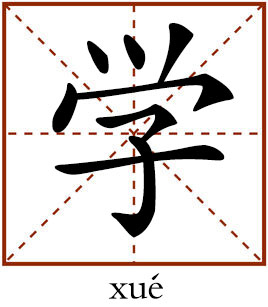Study

When used as a verb, this character means “to learn, study or imitate.” When used as a noun, this character refers to learning or school of thought.
敏而好学 不耻下问
mǐn ér hào xué, bù chǐ xià wèn
Min means “to be intelligent” and hao “to like” or “to be fond of.” Xue refers to learning. Chi means “to be ashamed” or “to be embarrassed” and xia refers to someone not as great in importance, status or knowledge as someone else. Wen means “to ask.”
This is a line from Analects. There was a statesman named Kong Yu during the reign of Duke Ling of Wei (r. 534–493 BCE). He figures in the chronicles as a disloyal and self-seeking minister. However, he was accorded the posthumous title “Wen” (“The Cultured”) after his death. One day, one of Confucius’s students named Zi Gong asked Confucius, “Why was Kong Wen called ‘Wen’ ?” Confucius answered, “Because he was diligent and so fond of learning that he was not ashamed to pick up knowledge even from his inferiors.”
Education and learning is an important part of Confucianism. For Confucius, everyone might be good at something and might be a teacher of others—“Even when walking in a party of no more than three I can always be certain of learning from those I am with. There will be good qualities that I can select for imitation and bad ones that will teach me what requires correction in myself.” Therefore, learning from anyone who can be learned from, regardless of status, economic conditions or intellectual level, is a core Confucian principle on learning and a precious idea in the hierarchical society of ancient China.
Many people have embodied this ancient Chinese philosophy. The Chinese herbalist Li Shizhen (1518–1593) spent decades compiling his highly influential materia medica, the Bencao Gangmu (Compendium of Materia Medica). He travelled extensively over a number of decades, gaining first-hand experience with many herbs and local remedies and consulting over 800 books—nearly every medical book in print at the time. He also consulted many people about herbs and remedies, including fishermen, woodcutters, hunters, and other people whom were considered of lower position at that time.
edited by REN GUANHONG
